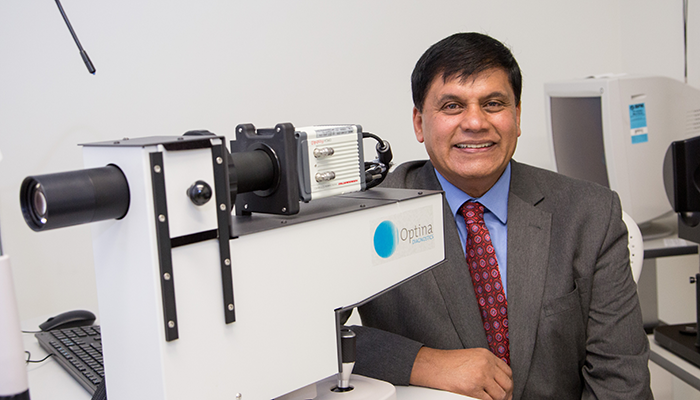New research into a blood biomarker for Alzheimer's disease shows that the protein GFAP can reliably indicate when symptoms are likely to begin – allowing better targeting of early-intervention programs.
Blood biomarkers for Alzheimer's disease can appear 10 years before symptoms of cognitive decline, helping target programs for early intervention, this new research has found.

Hope: Advancements made in Alzheimer's research at Macquarie University could improve early intervention.
Professor Ralph Martins, of the Macquarie Medical School, Centre for Ageing, Cognition and Wellbeing, says research into Alzheimer's is now suggesting there is a window of opportunity for either drug or lifestyle intervention where it may be possible to change the trajectory of the disease.
Timing is crucial
Martins says the new research is very exciting in this context because it could allow medical practitioners to identify when to intervene. He says the researchers compared three Alzheimer's-related brain proteins and found that the most reliable was GFAP (Glial fibrillary acidic protein).
"We are talking about a test that might give us a time point for intervention. If GFAP blood levels are high in cognitively healthy people at high risk who don't have symptoms, it would provide an opportunity to intervene well before the brain is damaged, so treatment could be much more effective," he says.
Martins says the results of the new research provide more certainty about when symptoms are likely to begin, allowing better targeting of early-intervention programs.
We've been looking at a number of biomarkers in the blood, and GFAP looks to have a lot of promise in terms of eventually taking it to clinical trials.
Research fellow at Macquarie Medical School Dr Pratishtha Chatterjee says previous research showed that people who didn't have symptoms but whose brain scans showed signs of Alzheimer's disease, also had higher blood levels of three Alzheimer's-related brain proteins called GFAP, p-tau181 and p-tau231.
"New research finds these blood tests can show elevated levels of the biomarker GFAP [Glial fibrillary acidic protein] 10 years before the onset of dementia symptoms," Dr Pratishtha says.
"This is really useful because it will allow us to screen for Alzheimer's in at-risk groups and target early-intervention programs that may delay and reduce cognitive decline."
Chatterjee is one of two lead authors of research by an international team of nearly 40 scientists from Australia, the US and Europe, published in Alzheimer's and Dementia: The Journal of the Alzheimer's Association
Alzheimer's – a degenerative brain disease that affects more than 450,000 Australians – occurs in a third of all adults aged over 85, and is Australia's second leading cause of death.
Screening solutions
"We don't currently have a blood test to diagnose Alzheimer's disease," says Martins.
Alzheimer's disease is the most common form of dementia and is characterised by an abnormal build-up of beta-amyloid protein, which collects between neurons and disrupts brain function.
Until about a decade ago, the brain changes in Alzheimer's disease were only detected post-mortem. While specialised brain imaging and cerebrospinal fluid (CSF) testing can now confirm the disease in living patients – these are intrusive and expensive tests and not suitable for screening a broader population, Martins says.
"We've been looking at a number of biomarkers in the blood, and GFAP looks to have a lot of promise in terms of eventually taking it to clinical trials," he says. Research published last year by Martins, Chatterjee and others found that 90 per cent of participants who had abnormal levels of GFAP in their blood plasma also showed signs of pre-clinical Alzheimer's disease on brain scans.
However, GFAP plasma levels were normal in the control group, whose brain scans showed no Alzheimer's signs.
"This accuracy shot up to 96 per cent when we factored in age, sex and whether they carried a genetic predisposition for Alzheimer's."
Genetic mutation helps identify timing
Chatterjee says the research team has already demonstrated that certain biomarkers indicate risk of developing Alzheimer's disease; but they needed to understand how the biomarker levels related to different stages of the disease to be clinically useful.
"We wanted to know how early in the disease trajectory do abnormal GFAP levels appear, and whether it would be similar in blood plasma, blood serum and cerebrospinal fluid, so we could identify the most useful test medium," she says.

Clues: Higher plasma GFAP levels detected in blood can be present years before a person has symptoms.
The scientists were able to compare blood samples from the Dominantly Inherited Alzheimer Network (DIAN) cohort. The DIAN is a remarkably useful international registry established in 2008 that followed more than 600 people from 20 countries who have one of three gene mutations linked to early-onset Alzheimer's.
The registry also follows the adult children of people with these mutations (each with a 50 per cent chance of inheriting a mutation), allowing the team to follow siblings in the DIAN cohort who had not inherited the genetic mutation, and who served as the control group.
"Less than one per cent of Alzheimer's patients have Dominantly Inherited Alzheimer's Disease, but because inheritance of this mutation means the offspring's disease trajectory closely follows the parent, we have a good indication of how long it will be, before their symptoms will appear," Chatterjee says.
Early indicators
The study found that people who had brain scans showing signs of Alzheimer's also showed higher levels of GFAP in their blood plasma as much as a decade before showing any symptoms of neurodegeneration and cognitive decline.
"We were able to link levels of GFAP in plasma with different stages in the sequence of Alzheimer's disease-related pathological and clinical events," says Chatterjee.
The scientists also found that abnormal GFAP levels in blood serum appeared from the pre-clinical stage of Alzheimer's disease similar to plasma GFAP; but tests of cerebrospinal fluid did not record abnormal levels of GFAP until the person showed symptoms of the disease.
This makes GFAP a useful biomarker for a blood test – and also suggests that high GFAP levels in cerebrospinal fluid might be a useful indication that there is more advanced neurological degeneration, Chatterjee says.
Could lifestyle interventions delay Alzheimer's?
Martins and his research team will also be involved in a major international Alzheimer's disease intervention trial linked to the World Wide FINGERS network based on a Finnish study that began in 2010.
Dr Stephanie Fuller, the clinical study coordinator at Macquarie Medical School, says that participants in the Finnish study undergoing a two-year lifestyle intervention program, showed a 25 per cent improvement in certain aspects of their cognition compared to a control group.
Australian researchers from two sites - Macquarie University in Sydney and Edith Cowan University in Perth - are collaborating with the world-wide FINGERS network. The researchers have established a two-year program labelled AU-ARROW (the Australian-multi-domain Approach to Reduce dementia Risk by protecting brain health with lifestyle intervention study).
Each research site will recruit 300 people aged 60-79 years who live within a five-kilometre radius of the study gym sites in Ryde in Sydney and in Perth, and they will be randomly allocated to a control or intervention group.

Professor Ralph Martins, pictured, is a Professor in the Department of Biomedical Sciences and the Centre for Ageing, Cognition and Wellbeing at Macquarie University.
Dr Pratishtha Chatterjee is a Research Fellow in the Department of Biomedical Sciences and the Centre for Ageing, Cognition and Wellbeing at Macquarie University.
Dr Stephanie Fuller is a Clinical Study Coordinator at Macquarie Medical School.






